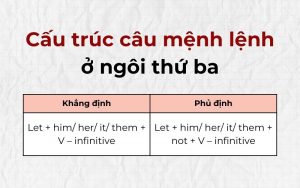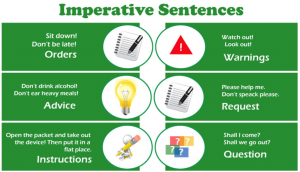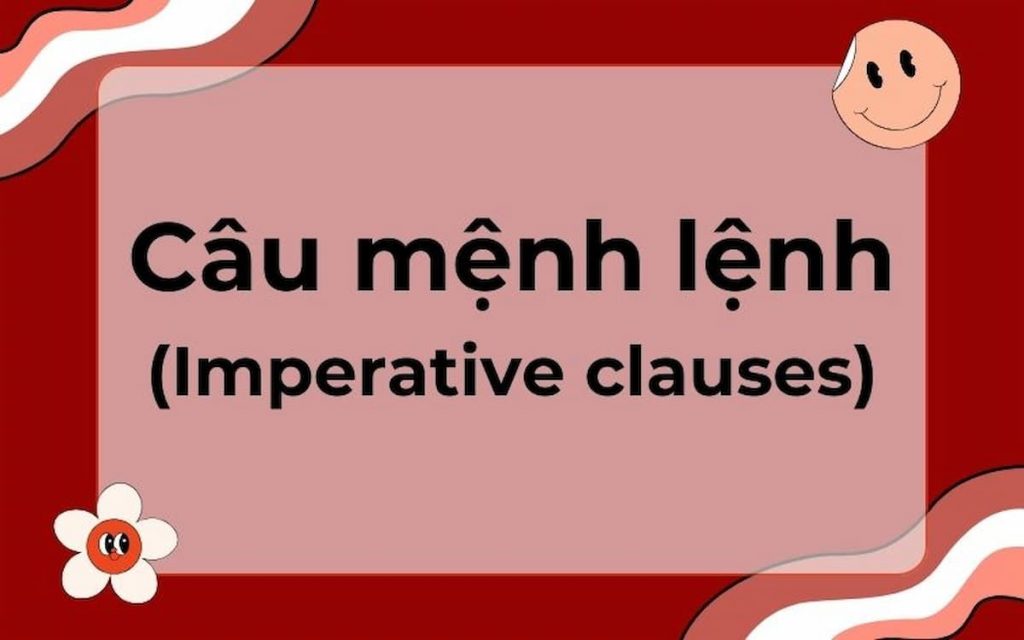Contents list
1. What are imperative sentences in English?
Imperative sentences (imperative clauses) are types of sentences used to give requests, instructions, guidance, suggestions, or warnings that require immediate action. Imperative sentences typically end with a period (.) or an exclamation mark (!) depending on the context and tone of delivery.
Essentially, imperative sentences are commands asking someone to perform an action. "Someone" doesn’t necessarily have to be a person. For example, when you give commands to virtual assistants like Alexa or Google Assistant, you’re using imperative sentences. Similarly, when you tell your dog to "sit," "stay," or "run," you’re speaking in imperative sentences.
Below are some examples of imperative sentences:
• Remember to clean the garbage today.
• ell me if I should go to Japan or Korea for my summer vacation.
• Leave the book on the table.

2. Types of Imperative Sentences in English
2.1 Direct Imperatives
Direct imperatives come in many forms and can be used depending on the context: affirmative imperatives, negative imperatives, or interrogative imperatives. Imperatives are often used with the word "please" to convey politeness, issuing requests that are not too forceful.
Imperative sentences or requests typically do not specify a subject as they are commands or requests aimed directly at someone or something. The subject is implied by the listener(s) in the conversation (one or multiple people).
Examples:
• Put your phone away.
• Join me in the study.
Imperative sentences with a specific subject are commands or requests that clearly identify the subject.
Examples:
• Ron! Go back to school.
• John from class 8B, go to the principal’s office.
Negative imperative sentences are requests or commands instructing the listener not to do something. Similar to affirmative examples, negative forms can also be used with imperatives, with or without a specified subject.
Examples:
• Do not smoking!
• Never judge someone before knowing their story.
• Harry! Stop making that noise.
Negative imperatives, or interrogative requests, are sentences used to make polite requests or ask questions to avoid pressuring the listener. Common modal verbs like can, could, may, would, will are often used.
Examples:
• Could you join me in the study?
• Can you show me how to write the essay?
In communication, imperative sentences can be used with the word 'please' to convey politeness. 'Please' can be placed at the beginning, within, or at the end of the sentence. For example:
• Please check the exam!
• Would you help me carry these books, please?
• Would you please take off your shoes?

2.2. Reported Commands
Reported commands are sentences that indirectly request, ask, tell, or order someone to do something. There are two types of reported commands: affirmative and negative.
Structure for affirmative reported commands, requesting someone to do something:
Formula: S + ask/order/tell + O + to + V
Examples:
• My father told me to clean my room.
Structure for negative reported commands, asking someone not to do something:
Formula: S + ask/order/tell + O + not + to + V
Examples:
• I told you not to play with him.
2.3. Conditional Commands
Most of the examples above are simple sentences with only one clause, but don't think that all commands are this short. A command can have multiple clauses, and in many cases, these clauses form conditional sentences.
A conditional sentence shows the cause and effect of something (to ensure, express possibility, or even impossibility). Let’s look at some examples of conditional commands below:
• If you miss the bus, call a Grab.
• When you hear your name, raise your hand.
2.4. Commands Starting with Verbs
Most commands begin with imperative verbs. Common imperative verbs in English include: let, do, follow, go, walk, stop, run, understand, spoil... Imperative verbs are in their base form, and when followed by objects in their structure, they form commands.
Examples:
• Follow me!
• Go back to school.
• Walk on the right side of the pathway.
• Let her go.
• Do not smoking.
As you can see, verbs typically come first in commands. However, this is not always the case.
• Make sure you understand why we do this exercise.
• Please don’t spoil the movie.
In certain contexts, the verb alone can form a complete command:
• Stop!
• Run!
















